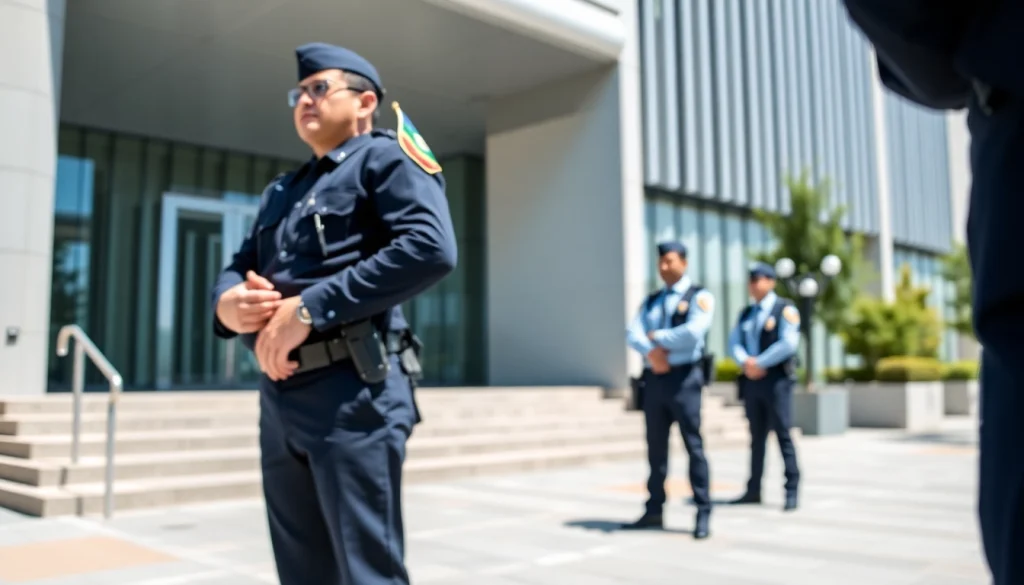
Understanding the Role of Security Officers for Hire
As businesses and individuals navigate an increasingly complex world, the demand for professional security services has surged. Hiring security officers for hire has become a prudent decision for safeguarding assets, ensuring safety, and maintaining order. This article explores the various dimensions of hiring security officers, from understanding their roles to navigating legal considerations and enhancing their effectiveness in your organization.
What Security Officers Do
Security officers embody a range of responsibilities, crucial to the safety and security frameworks of businesses and events. Ranging from preventive measures to reactive interventions, their day-to-day tasks can include:
- Patrolling: Regular monitoring of designated areas to deter criminal activity and ensure safety.
- Surveillance: Using technology like cameras and motion sensors to monitor locations and collect evidence of incidents.
- Access Control: Screening individuals entering premises, ensuring only authorized personnel have entry.
- Incident Reporting: Documenting incidents, preparing reports, and coordinating with law enforcement when necessary.
- Emergency Response: Providing immediate assistance in emergencies, from medical situations to security breaches.
These roles necessitate not just physical presence but also analytical and interpersonal skills, enabling officers to respond effectively to various situations.
Different Types of Security Services
Hiring security officers can take many forms, reflecting the specific requirements of your situation. Some of the most common types of security services include:
- Unarmed Guards: Typically monitor premises without carrying weapons, suitable for environments where less aggressive security is needed.
- Armed Guards: Equipped with firearms and trained to handle high-risk situations, these officers are essential for high-value assets or heightened security environments.
- Mobile Patrol: Officers that patrol in vehicles, offering rapid response capabilities across a broad area.
- Event Security: Specialized teams trained for specific events, managing crowds and maintaining order at venues like concerts and conferences.
- Corporate Security: Security tailored for businesses, focusing on asset protection, employee safety, and cybersecurity measures.
Choosing the right type of security service often depends on assessing the risks and potential threats associated with your environment.
Benefits of Hiring Security Officers
Engaging security officers offers numerous advantages, not only for deterring crime but also for creating a safe environment. Some key benefits include:
- Enhanced Safety: Professional security personnel are trained to recognize and mitigate risks, creating a more secure atmosphere for employees and customers alike.
- Deterrent Effect: The visible presence of security officers can significantly deter criminal activity and instill a sense of safety within the community.
- Peace of Mind: Knowing that trained professionals are managing security concerns allows business owners and event organizers to focus on their core responsibilities.
- Crisis Management: Security officers are trained to respond to emergencies swiftly, ensuring effective handling of various crisis situations.
- Improved Customer Experience: A secure environment enhances customer confidence, fostering repeat business and positive reviews.
How to Select the Right Security Officers for Hire
Choosing the best security officers requires careful consideration to ensure that the selected personnel align with the specific needs of your event or business. Here are key factors to assess during the selection process.
Assessing Qualifications and Experience
When evaluating security officers for hire, it’s critical to check their qualifications and experience. Look for:
- Certifications: Ensure candidates possess relevant security certifications and licenses prescribed by local or state authorities.
- Background Checks: A thorough background check can reveal a candidate’s criminal history and ensure they have a clean record.
- Experience: Opt for officers with a solid track record in security roles, particularly in settings similar to your needs.
- Training: Inquire about specialized training in areas like conflict resolution, first aid, or specific security technologies.
Interview Strategies to Identify the Best Candidates
Effective interviewing is a key component in selecting the right security personnel. Implement the following strategies:
- Behavioral Interviews: Ask candidates to share past experiences in handling difficult situations, revealing their problem-solving and interpersonal skills.
- Scenario-Based Questions: Pose hypothetical scenarios requiring the candidate to articulate how they would respond to various security incidents.
- Assessment Tests: Administer assessments for physical fitness, observation skills, or situational judgment to further evaluate capabilities.
Understanding Security Needs Specific to Your Event
Before hiring, it’s essential to assess and understand the unique security needs pertaining to your event or business setting. Consider:
- Event Type: Different events (corporate functions, concerts, weddings) will have diverse security requirements based on crowd size and potential threats.
- Duration: Determine if you need security for a one-time event or an extended period, which impacts hiring schedules and resource allocation.
- Location Risks: Analyze potential risks associated with the location, including crime rates and previous incidents, to tailor the security approach accordingly.
Cost Factors Involved in Hiring Security Officers
Understanding the financial considerations involved in hiring security officers can help businesses plan their budgets effectively. Several factors influence the overall cost.
How Pricing Structures Work
The cost of hiring security officers can vary widely based on various variables, including:
- Type of Service: Armed security typically costs more than unarmed personnel due to the additional training and risk involved.
- Experience Level: More experienced officers may demand higher wages, reflecting their expertise and training.
- Duration of Service: Longer-term contracts often receive discounts, whereas short-term assignments may incur higher hourly rates.
- Location: Costs may vary geographically, depending on local demand for security services and cost of living.
Comparing Costs of Various Security Services
When budgeting for security personnel, it’s crucial to compare the services offered by different providers. Here are steps to take:
- Request Quotes: Contact multiple firms for detailed quotes, ensuring you understand the pricing model and included services.
- Evaluate Packages: Some security firms offer bundled services, like armed and unarmed personnel together, which may save costs overall.
- Check for Hidden Fees: Ensure clarity on any potential additional costs—for equipment, transportation, or overtime charges.
Budgeting for Short-Term vs. Long-Term Needs
Your budgeting approach should align with the nature of your security needs:
- Short-Term Needs: For events or temporary projects, consider hourly rates and the total number of hours required.
- Long-Term Assignments: For ongoing security, explore negotiated contracts for improved rates and service guarantees.
- Contingency Planning: Always allow a contingency budget to accommodate unforeseen circumstances and enhance your security response.
Legal Considerations When Hiring Security Officers
Engaging security personnel entails understanding various legal frameworks to ensure compliance with regulations and mitigate liability.
Licensing Requirements for Security Personnel
Most states require security personnel to have valid licenses or permits to operate legally. Key considerations include:
- State Regulations: Research your state’s licensing requirements and ensure that your hired security officers adhere to them.
- Background Verification: Ensure that security officers provide proof of licenses and that they have passed necessary background checks.
- Training Standards: Verify that the officers have completed the requisite training programs mandated by law.
Types of Insurance Coverage Necessary
Hiring security officers also involves understanding the insurance landscape, including:
- General Liability Insurance: This protects against claims of injury or damage caused during security operations.
- Professional Liability Insurance: Covers claims related to errors or omissions in their security services.
- Workers’ Compensation Insurance: Essential for covering job-related injuries sustained by security personnel.
Understanding Liability and Responsibilities
It’s crucial to comprehend the ramifications of hiring security personnel. Factors to keep in mind include:
- Responsibility for Actions: Employers can be held accountable for unlawful actions taken by security personnel under their employment.
- Clear Contractual Agreements: Ensure that contracts outline responsibilities and limits of liability for both parties.
- Incident Documentation: Develop protocols for documenting incidents clearly to mitigate legal risks in the event of disputes.
Maximizing the Effectiveness of Your Security Officers for Hire
Once you have hired your security officers, ensuring their effectiveness is paramount. Here’s how to achieve this:
Training and Development Opportunities
Investing in ongoing training for your security personnel can enhance their performance in the following ways:
- Regular Training Sessions: Refreshers on emergency protocols, conflict resolution, and first aid ensure that officers remain sharp.
- Workshops on Technology: Familiarize officers with the latest security technology and software relevant to their roles.
- Feedback Mechanism: Create a feedback loop where officers can communicate challenges faced on the ground, leading to better training opportunities.
Implementing Communication Protocols
Establishing clear communication protocols is crucial for the coordinated operation of security teams. Consider these strategies:
- Radio Systems: Equip officers with reliable communication devices to ensure swift communication during incidents.
- Daily Briefings: Hold briefings to discuss schedules, potential threats, and officer assignments to keep everyone informed.
- Reporting Chains: Construct clear hierarchies for incident reporting to ensure efficiency in response to security events.
Evaluating Performance and Adjusting Strategies
Periodically assessing the performance of security personnel is vital for ongoing success. Implement the following methods:
- Regular Performance Reviews: Conduct evaluations based on incident management, reporting accuracy, and overall effectiveness.
- Feedback from Stakeholders: Gather input from employees, clients, and event attendees about their interactions with security personnel.
- Adapt and Innovate: Remain flexible in strategy, adapting based on performance metrics and emerging security challenges.






